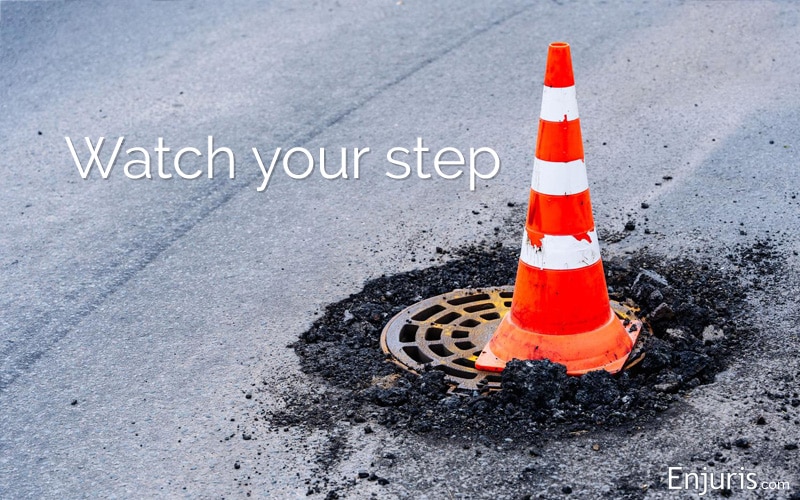
A manhole accident can leave a person with devastating and life-changing injuries
Manhole accidents aren’t common, but they do happen. Here’s what you need to know if you’re injured and require legal help.
Manhole accidents, although not common, can lead to severe injuries and significant impacts on the lives of those affected. This guide provides comprehensive information about manhole injuries in the U.S., including your legal rights and how you might seek compensation if you've been injured.
U.S. manhole injuries: A statistical overview
Between 2000 and the present day, the U.S. has seen a concerning number of manhole-related incidents:
- The Consumer Product Safety Commission (CPSC) reported approximately 5,000 manhole-related injuries annually in the U.S.
- About 60% of these injuries were linked to trip-and-fall accidents.
- While fatalities are rare, severe injuries such as fractures, sprains, and even traumatic brain injuries are common outcomes.
- Employees working in construction and maintenance industries have been found particularly susceptible, accounting for around 40% of all reported manhole injuries.
Types of manhole injuries
Manhole injuries can vary greatly in severity and type. Here are the most common:
- Fractures and broken bones: Impact from a fall can cause broken bones, particularly in the limbs.
- Sprains and strains: A quick maneuver by a person attempting to avoid a fall into a manhole could cause sprains or muscle strain injuries.
- Head injuries: A fall could result in a head injury or concussion, which could have serious long-term impacts.
- Spinal cord injuries: These can lead to partial or full paralysis and are usually the result of falling into an open manhole.
- Cuts and bruises: Minor injuries, such as cuts and bruises, can occur from contact with the manhole cover or surrounding area.
Pedestrians and manhole injuries
If you're a pedestrian who has been injured in a manhole accident, you could have a valid personal injury claim. This generally depends on whether the accident was due to negligence or a failure of duty of care by a responsible party like a city municipality, a utility company, or a private contractor.
- Duty of care: This refers to the responsibility of the authority in charge to maintain manholes and keep the public safe.
- Breach of duty: If this duty of care was breached—for instance, if an authority failed to secure or replace a loose manhole cover—that entity could be held liable for injuries sustained.
- Injury: The accident has to have caused an actual injury, not the possibility that one could have happened. You could trip over a loose manhole cover, but if you regained your balance and did not suffer an actual physical injury, then you would not have grounds for a legal claim.
- Damages: To file a claim for a personal injury, it has to cost you money. You can claim expenses like medical treatment, lost time from work, and other things that are directly resulting from the injury.
Workers' compensation for manhole injuries
If you're a worker injured in a manhole-related accident while on duty, you're likely entitled to workers' compensation benefits.
Here are some crucial steps:
- Report the injury: Notify your employer as soon as possible about the injury.
- Seek medical help: Get the necessary medical treatment promptly.
- File a claim: Submit a workers' compensation claim through your employer or directly to the insurance company.
- Legal help: If your claim is denied, consult a personal injury lawyer to understand your rights and potential next steps.
Workers' compensation is a state-regulated insurance program designed to provide financial support to employees who have suffered job-related injuries or illnesses. It functions on a "no-fault" system, meaning you're eligible for benefits regardless of who's at fault for the workplace incident.
Key points you should know about workers' compensation:
- Eligibility: Generally, both full-time and part-time employees are eligible. You must have sustained your injury or illness due to or in the course of your employment. It's critical to report the incident to your employer promptly.
- Types of benefits: Depending on the severity of your injury, benefits can include:
- Medical care: Coverage for hospital and medical expenses necessary to diagnose and treat your injury or illness.
- Disability benefits: Payments for a portion of the wages lost due to your injury's impact on your ability to work.
- Rehabilitation: Services that help you return to work or cope with the aftermath of the injury.
- Death benefits: If a worker dies on the job, these are benefits paid to their dependents.
Remember, specific guidelines and benefit amounts can vary from state to state. Always consult with a workers' compensation attorney to understand your rights and the potential benefits available to you in your unique situation.
Avoiding and preventing manhole injuries
While the duty of care largely rests with authorities, individuals can take certain steps to avoid manhole-related accidents:
- Always be aware of your surroundings while walking or working.
- Avoid distractions like mobile devices when navigating areas where manholes are present.
- If you're a worker assigned to manhole-related tasks, ensure that you've received proper safety training and are using appropriate protective equipment.
Being a victim of a manhole injury can be a stressful and challenging situation. By understanding your rights, the types of injuries, and how to navigate through the legal process, you can make informed decisions that help protect your interests. Always consult with a personal injury lawyer if you have been involved in a manhole accident to understand the full extent of your legal rights and options.
See our guide Choosing a personal injury attorney.
